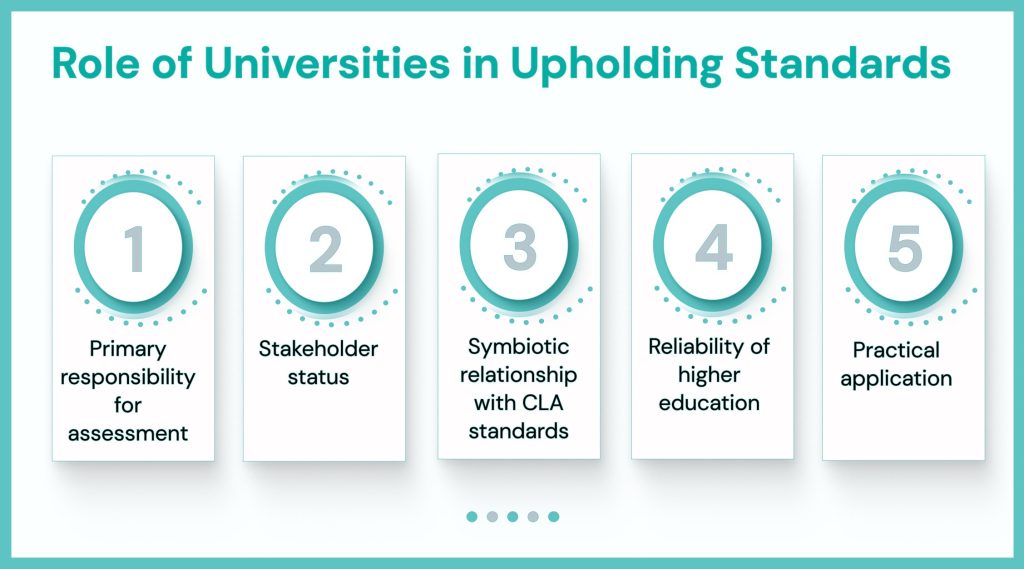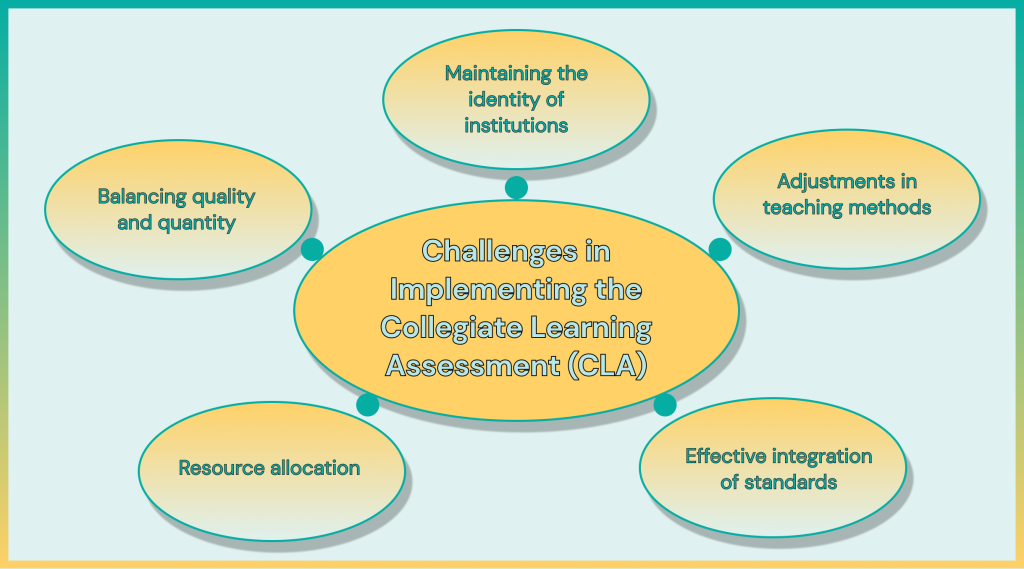Higher education has always been the area to which a lot of attention is riveted. The Collegiate Learning Assessment (CLA) serves as a sign that points you in the right direction. This is the so-called collegiate learning assessment setting standards for performance. In the future, according to these standards, the work of the university and the progress of students of a particular university will be evaluated. The role of CLA in quality education is very important and will increase as the demand for quality education increases. From this article, you can learn the description and more about the condition or intricacies of the CLA and the meaning of this assessment.
Introduction to the Collegiate Learning Assessment
The standards for higher education are changing all the time. This may depend on the development of new technologies and changing requirements of future students. In this case, collegiate learning assessment setting standards allow not only to adhere to existing standards but also to constantly strive to improve the educational process. In other words, it is an indispensable tool for colleges and universities around the world. Want to learn more about what CLA is and what a serious flaw in the collegiate learning is?
Historical Background of the Assessment
The system of university education lagged behind the ideal for a long time and had many serious shortcomings. When the gaps in the tools available for assessing student learning at the undergraduate level became too visible, the CLA emerged. Why did it happen? Many traditional methods could no longer give a complete picture of the entire learning path. This made full control almost impossible. CLA has become a great solution for settling collegiate learning. Thus, an honest assessment of student learning appeared, which allows us to analyze not only the memorization of the material but also the critical thinking of students.
Importance in Modern Education
Today, the meaning of Today Collegiate Learning Assessment has changed a bit. Now it is not just an evaluation tool. With the help of the Collegiate Learning Assessment, you can keep an eye on the ever-changing dynamics of modern education. In many ways, this direction is influenced by the emergence and popularization of digital educational platforms. In this case, the CLA serves as a touchstone, ensuring that the quality of learning on college campuses remains uncompromising.
What else shows the importance of this assessment? Unfortunately, there is another flaw in the collegiate learning. This is about underestimating the diploma of higher education. With the advent of short courses and fast learning platforms, there has been a trend of prospective students turning away from higher education. However, the CLA helps to reassure students and provides many arguments in favor of the fact that students will be not just holders of academic degrees but also thinkers, innovators, and leaders of tomorrow.
Setting the Bar: What are the Standards?
The approach to setting standards is very strict. Collegiate Learning Assessment sets not just benchmarks but monitors the reflection of the skills and knowledge that students should have after receiving a diploma of higher learning. However, the standards already set will continue to evolve and adjust to the dynamic demands of the global labor market. It will also include all the aspirations of the student community.
Criteria for Performance Evaluation
There is no one criterion by which the performance evaluation within the CLA can be established. This area is very versatile. In this case, learning in higher education assessment does not just focus on academic scores. Instead, the focus is on areas that are often overlooked by traditional assessments. It’s about critical thinking, analytical thinking, as well as the ability to solve problems. However, these parameters are only part of the assessment. The performance of each student can be additionally assessed by some parameters that accurately reflect limited learning on college campuses.
Role of Universities in Upholding Standards
The responsibility for the implementation and delivery of a successful assessment of collegiate learning rests with the Universities. As the first and foremost stakeholders, they are responsible not only for preparing their students for assessment but also for ensuring that the standards set by the CLA are integrated into their curricula and teaching methods. Such a symbiosis becomes a confirmation of the reliability of higher education, as well as confirmation that performance standards are not just theoretical guidelines but also a life experience for each student.
University Policies and the Assessment
All Universities must pursue an internal policy to optimize the educational process. This allows you to adjust the process by your goals and objectives and, as a result, give a fair assessment of university education. What does it look like? First of all, we are talking about curating the curriculum. In this case, special attention should be paid to critical thinking, as well as creating an environment that will encourage analytical thinking. In addition, an important task that is entrusted to universities is to take the initiative in eliminating any flaw in the collegiate learning. This adds a more important status for learning in higher education.
Comparing Performance Across Different Colleges
In addition to performance appraisal, the purpose of the CLA is to conduct comparative assessments of performance across colleges. This not only encourages healthy competition between institutions but also provides potential students with valuable information to make informed decisions. Results evaluations are open and accessible to all potential students. This provides an opportunity for each college to demonstrate its commitment to excellence.
Benefits of Meeting the Collegiate Learning Standards
Compliance with standards has many advantages not only for higher education institutions but also for students. These benefits go far beyond academic excellence and pave the way for a brighter, more informed future. What are the benefits of learning in higher education assessment? See further in the article!
For Students
As statistics show, all students who meet CLA standards are distinguished not only by high academic performance. They are predominantly versatile people with the skills needed to thrive in the real world. These students can demonstrate excellent critical thinking abilities as well as excellent written communication skills. However, at some point, even the learners who write admission essays excellently could benefit from our college essay writing service. CustomWritings helps students who need professional assistance with college application essays.
In addition, no inventory is needed for diagnostics. Separately, the ability of such students to solve problems is noted. Such qualities are highly valued in the labor market and, therefore, are in demand by employers. In addition, the confidence gained by meeting such strict standards improves, and is the highest measure that prepares them for future challenges in both their professional and personal lives.
For Institutions
In the case of colleges and universities, CLA compliance speaks volumes about their credibility and has a significant impact on reputation. Therefore, higher-level students prefer such educational institutions. In addition, compliance with standards allows you to analyze the quality of education and get a report on a particular methodology from the inside. Thus, such colleges and universities can continuously improve. The college’s improving and teaching methods are becoming more accessible. In a world where the quality of education is often under scrutiny, meeting CLA standards is a badge of honor, a mark of distinction that sets them apart.
Challenges in Implementing the Assessment
The integration path of the Collegiate Learning Assessment comes with some challenges that are part of the educational process. The number of advantages is much greater, however, if a flaw in the collegiate learning is encountered, then it should be immediately eliminated to further the smooth implementation of high standards.
Addressing Common Concerns
It is a mistake to think that CLA can increase the already growing workload on students. The CLA system should not be underestimated. This is not just another text on knowledge. It would be much more accurate to say that the CLA is a comprehensive assessment of a student’s learning path. It can be difficult to implement all the standards of this assessment system without harming the identity of the institution. There are three key factors in solving these problems:
- Support;
- Education;
- Dialogue.
With a proper understanding of the essence of university education assessment, institutions can effectively deal with these problems.
Case Studies: Universities Excelling in the Assessment
Several universities in the US have not only adopted the CLA but have demonstrated exemplary performance. Today, these higher education institutions serve as role models and light the way for other universities and colleges. By integrating the CLA standards into their foundation, they have redefined the criteria for the quality of university education and can speak for the best professionals in their field, who are the most sought-after candidates in the labor market.
Future of the Collegiate Learning Assessment
The assessment of university education is constantly evolving and modernizing. As the higher education landscape changes, the CLA will also adapt to new standards. This confirms the relevance and necessity of this assessment. In other words, CLA will once again be able to show what the gold standard of higher education should look like.
Technological Advancements and the Assessment
The development of technology could not bypass this direction. The future of CLA is inextricably linked to technological innovation. The main directions are recognized:
- Analytics based on artificial intelligence. This provides a deeper understanding of student performance.
- Development of digital platforms. Students and universities will have the opportunity to get feedback in real time.
In this way, both students and universities get a more reliable, efficient, and comprehensive assessment process, further raising the standards of university education.
Global Perspective: How Does the U.S. Compare?
The US was first on the list for adopting and benefiting from university assessments. However, the educational landscape is constantly evolving and changing. Benchmarking can provide valuable information. Despite the great achievements that the United States has made and the famous Universities in the educational process, there is always an opportunity to improve and move on. I would like to believe that the highest standards will certainly be achieved shortly. However, given the speed of technological development, new measures will always be set.
Conclusion
If you analyze all the information discussed in this article provided by our college admission essay writing service, it will become clear that CLA is a very important tool on the way to improving the educational process. Due to continuous development, CLA will continue to play a key role in shaping the fate of both students and many institutions. This will open up an opportunity for universities to constantly improve their standards and be competitive. For less successful schools that have not yet reached the desired level, the CLA system will be a step-by-step guide to success.
If you are interested in having your institution or your academic path meet the highest standards of university education, please contact us.
Frequently Asked Questions (FAQs)
What is Peer Learning Assessment?
The Collegiate Learning Assessment (CLA) is a unique tool that sets the standard for assessing critical thinking and problem-solving skills in colleges. Thus, students receive an independent rating assessment of universities, and educational institutions can compare their achievements with world standards.
Why is CLA important for modern education?
CLA is central to today’s educational environment. This integrated approach to assessment allows you to analyze the quality of learning from different points of view. This is not at all what you are used to seeing in traditional academic assessments. CLA ensures that the quality of limited learning on college campuses remains uncompromising.
What are the benefits for universities of implementing CLA?
Universities that adhere to CLA standards have the highest rankings. This is a sure way to improve your reputation and attract new students. In addition, such educational institutions will always be aware of new teaching methods and will be able to constantly improve the quality of the learning process.
Are there any problems with CLA implementation?
In the process of implementing the Collegiate Learning Assessment, some schools may encounter problems that are primarily associated with an increase in the burden on students. Another important dilemma is the university’s fear of losing its identity.
What is the US global comparison in terms of CLA adoption?
The US has been at the forefront of CLA adoption and use. However, despite this, there is always room for learning and growth to provide unparalleled standards of university learning.






